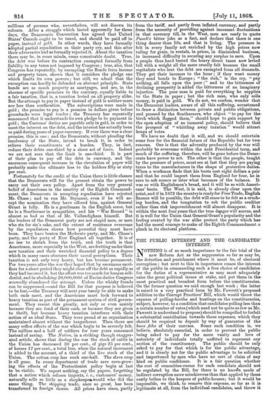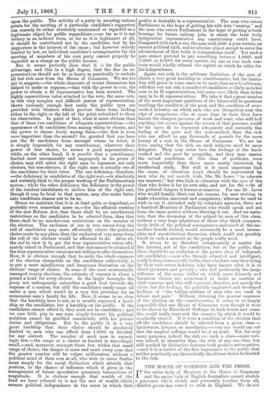THE PUBLIC INTEREST AND THE CANDIDATES' INTEREST.
NOTHING is of so much importance to the fair trial of the new Reform Act as the suppression so far as may be, the detection and punishment where it must be, of electoral corruption ; but next to this in importance comes the interest of the public in commanding such a free choice of candidates for the duties of a representative as may most adequately raise the great political issues at stake, and put them in the- most practical and broadest form before the constituencies. On the former question we said enough last week ; the latter is raised in a very practical form by Mr. Fawcett's proposed addition to the Corrupt Practices' Bill, which would throw the- expense of polling-booths and hustings on the constituencies, subject, however, to a condition that candidates polling less than a certain number of votes (which need not be quite so few as Mr. Fawcett is understood to propose) should be compelled to forfeit a substantial contribution towards those expenses, which they should be required to deposit by way of guarantee of the- bona fides of their canvass. Some such condition is, we- believe, absolutely essential, in order to prevent the public being asked to pay for the mere vanity and love of notoriety of individuals totally unfitted to represent any section of the constituency. The public should be only- asked to pay for that which is for the public advantage,. and it is clearly not for the public advantage to be solicited and importuned by men who have no sort of claim of any kind on public confidence. It is a fair question whether- the cost of committee-rooms for each candidate should not be regulated by the Bill, for there is no knovin mode of indirect corruption more mischievous than that applied by these costly bribes to the keepers of public-houses; but it would be impossible, we think, to remove this expense, so far as it is legitimate at all, from the individual candidates, and throw it
upon the public. The activity of a party in securing various points for the meeting of a particular candidate's supporters can scarcely be either absolutely condemned or regarded as a legitimate object for public expenditure ;—so far as it is not bribery in an indirect form, so far as it is legitimate at all, it should be contributed not by the candidate, but by his supporters in the interest of the cause ; but however strictly limited by law, an individual candidate's arrangements for the meeting of members of his own party cannot properly be regarded as a charge on the public income. But it seems perfectly clear that it is for the public advantage, and this in a high degree, that the fine on re- presentatives should not be so heavy as practically to exclude all but rich men from the House of Commons. We are too apt to suppose,—the whole character of recent discussions has helped to make us suppose,—that with the power to vote, the power to obtain a fit representative has been secured. The highly superstitious value attached to the vote, the mere vote, in this very complex and difficult matter of representation, shows curiously enough how easily the public eyes are provided with blinkers which prevent them from looking either to the right or the left of the point submitted to them for observation. In point of fact, what is more obvious than that of these two conditions of adequate representation,—the appearance of fit candidates from among whom to choose, and the power to choose freely among them,—the first is even more important than the seconds for, granted that you have not the fit candidates from amongst whom to select, it is simply impossible for any constituency, whatever their power of free choice, to secure a good representative ; while, on the other hand, it is possible that a constituency limited most unreasonably and improperly in its power of choice, may still select the right man to represent not only electors, but non-electors, if the right man is actually one of the candidates for their votes. The one deficiency, therefore, —the deficiency in candidates of the right sort,—is absolutely and certainly fatal to the proper working of the Parliamentary system ; while the other deficiency, the deficiency in the power of the resident inhabitants to declare him of the right sort, though it may be fatal to that system, may also under fortu- nate conditions chance not to be so.
Hence we maintain that it is at least quite as important,— probably even somewhat more so,—for the efficient working of the new Reform Act, that there shall be no mischievous restrictions on the candidates to be selected from, than that there shall be no mischievous restrictions on the number of the electors. The exclusion of one or two names from the roll of candidates may more effectually vitiate the political choice made by any place, than the exclusion of very many from the roll of the electors would be effectual to do. After all, the end in view is to get the true representative voices ulti- mately raised in Parliament, and that end cannot be attained if the true representative voices are not willing to offer themselves. Now, it is obvious enough that to make the whole expenses of the election chargeable on the candidates collectively, is to put a most mischievous and dangerous limitation on the electors' range of -choice. In some of the most economically managed county elections, the estimate of expense is about a pound a head for every elector. In the larger boroughs the party not unfrequently subscribes a good deal towards the expense of a contest, but still the candidates rarely come off under a sum which would be a very fair provision for an economical man's family for life. Now, it seems to us clear
that the hardship here is not, as is usually supposed, a hard- ship on the candidates, but a hardship on the public. If the candidates cannot afford it, they need not be candidates ; and we owe little pity to any man simply because his political ambition cannot be gratified consistently with his private duties and obligations. But to the public it is a very
great hardship that their choice should be absolutely limited to men who can afford from 1,0001. to 10,0001.
for any contest. The number of such men is exceed- ingly few,—the range of a choice so limited is exceedingly small,—and, moreover, amongst those few, within that small range of choice, the danger is more and more every year that the greater number will be vulgar millionaires, without a political mind of their own at all, who wish to enter Parlia- ment simply for the social distinction which attends that position, or the chance of influence which it gives in the management of future speculative pecuniary transactions of magnitude. It is obvious enough that wealth of the kind we have referred to is not the sort of wealth which secures political independence in the sense in which that quality is desirable in a representative. The man who enters Parliament in the hope of getting his wife into "society," and the man who enters Parliament in the hope of getting a fresh leverage for future railway jobs, is about the least truly independent representative any constituency could have. Compared with such a one, the man with 500/. a year certain, an earnest political faith, and no ulterior object except to serve the advancement of that faith, is independence itself. Yet such a man cannot pretend to pay something between 1,0001. and 7,000/. or 8,000/. for every contest, for one or two such con- tests would wholly exhaust the capital on which he relies for his independence.
Again, not only is the arbitrary limitation of the area of choice a very great hardship to constituencies, but the limita- tion will prove in some cases to be more than merely arbitrary, will shut out not only a number of candidates as likely as richer men to be fit representatives, but some more likely than richer men to be fit representatives. We take it that a great number of the most important questions of the future will be questions touching the condition of the poor, and the condition of over- worked industry, on which men who are themselves near the edge of competence, who at some time in their lives have known the sharpest pressure of work and want, who still feel anything but secure against the return of that pressure, would be far more fit to represent adequately and earnestly the feeling of the poor and the over-worked, than the rich who can afford to pay thousands of pounds for the mere luxury of a seat in the House of Commons. We are far from saying that the rich on such subjects need be mere delegates. They may enter into the feelings of the hard- worked and the poor by sympathy, and they may master the actual conditions of this class of problems, even more impartially than those more nearly interested, by intellectual study. But still it is most important that the cause, of education (say), should be represented by men who do not merely wish, like Mr. Lowe, " to educate our masters ;" but who look at education with the eyes of the class who desire it for its own sake, and not for the s ake of the political dangers it lessens or removes. For one Mr. Lowe who would frankly blurt out his reasons for now wishing to make education universal and compulsory, whereas he used to wish to see it extended only by voluntary agencies, there are a hundred Members of Parliament who would speak and act from the same motive without blurting it out. And we main- tain that the discussion of the subject by men of this class, without a very large admixture of those who think compara- tively little of the political consequences and much of the im- mediate benefit desired, would necessarily be a most incom- plete and unsatisfactory discussion, which could not possibly result in such a measure as the people really need.
It seems to us therefore conspicuously a matter for the interest, not of the candidates, but of the public, that there should be no exclusion of the poorer class of independ- ent candidates,—men who, though educated and intelligent, really belong economically to the class who have won their living by their own severe industry, who have known what it is to dread ignorance and poverty ; who feel profoundly the insig- nificance of the many trifles on which more leisurely and luxurious classes are accustomed to insist as matters of vital concern; and who will represent therefore not merely the views, but the feelings, the painfully implanted and developed feelings, of "the toiling millions of men who are sunk in labour and pain." Without throwing the general expenses of the election on the constituencies, it seems to us simply impossible that our House of Commons, even though it were to be chosen by Household Suffrage in both towns and coun- ties, could really represent the country by which it would be nominally elected. If it were a condition of the election that
all the candidates should be selected from a given class,—
landowners, lawyers, or merchants,—every one would cry out that the amplest suffrage would be of no avail. Yet, for very many purposes, indeed, the rich are such a class—more vari- ous, indeed, in character than the rich of any one class, but still marked by distinctive features both positive and negative, —and it is a matter of the first importance to the public that neither practically nor theoretically should our choice be limited to the rich.































 Previous page
Previous page